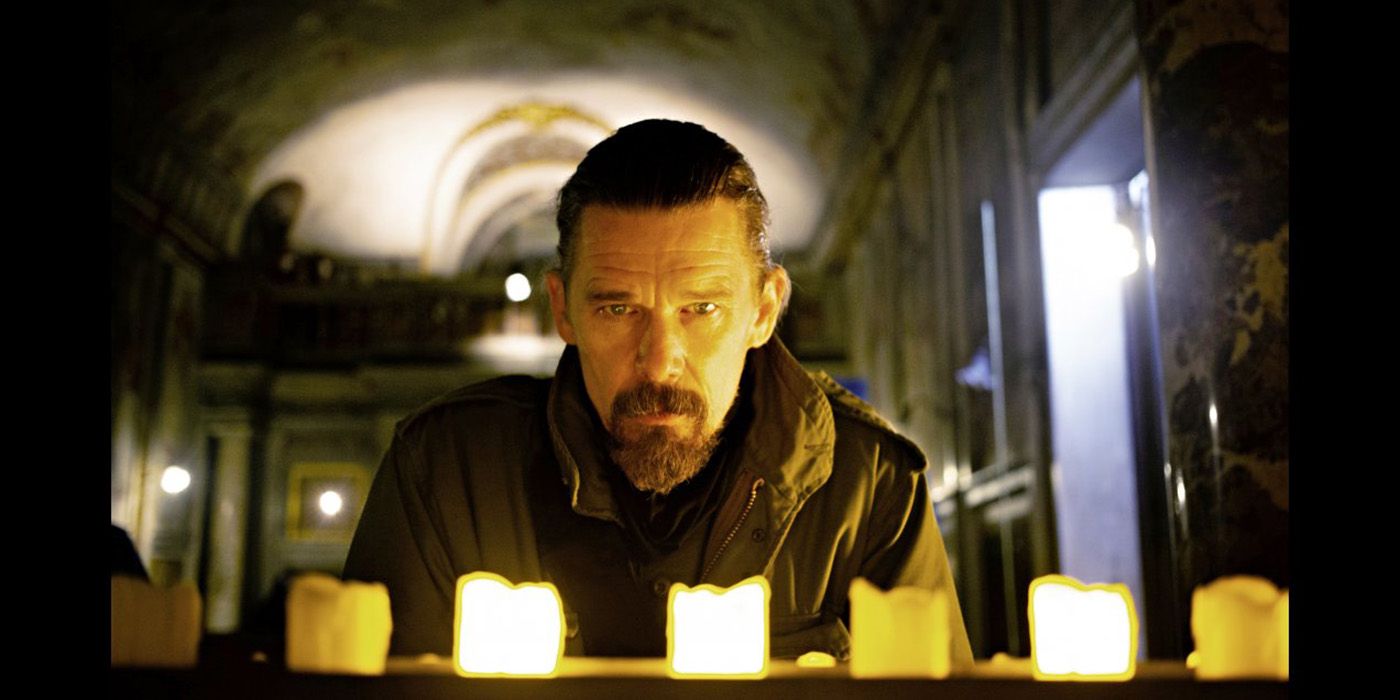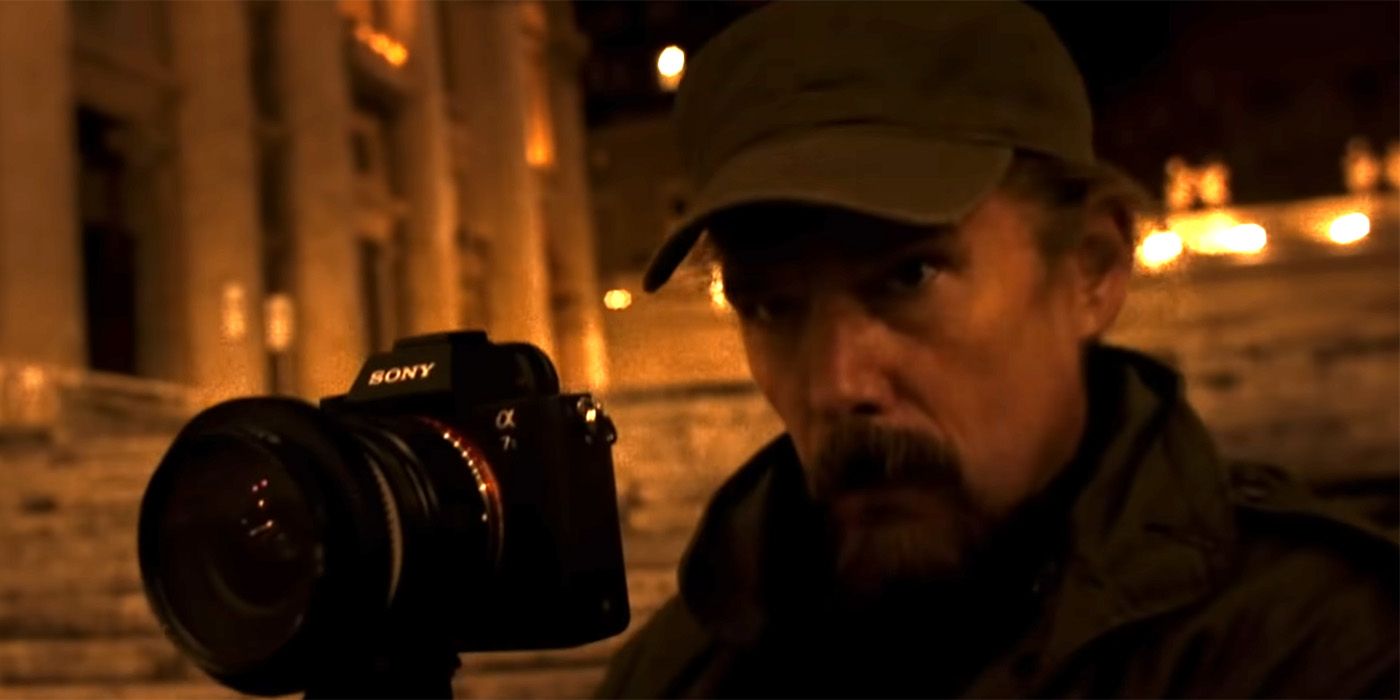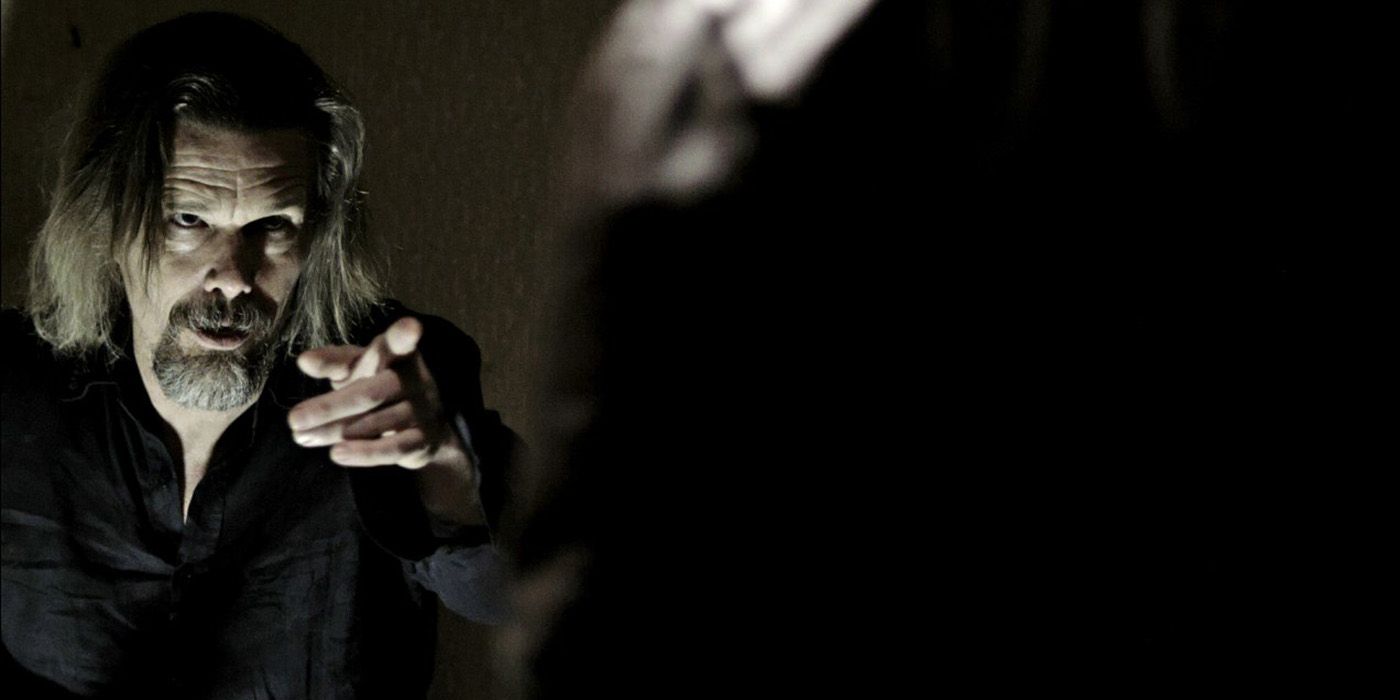Zeros and Ones marks the latest Rome-set film from acclaimed writer/director Abel Ferrara. The thriller revolves around American soldier J.J. as he ventures through the seedy underbelly of the Italian capital to stop an imminent terrorist bombing and find his imprisoned rebel brother, Justin, who holds knowledge that could thwart the attack.
In time for the film's digital release, Screen Rant spoke with Zeros and Ones writer/director Ferrara and star Ethan Hawke to discuss making the pandemic-set thriller, finding the film's surreal tone, and more.
Screen Rant: This is quite an interesting concept for a film, what was the birth of this film for you?
Abel Ferrara: You know, I'm always asked that question and sometimes I try to answer it, like, "Where does an idea come from," is a tough one. Obviously, it's a pandemic and I was thinking about the pandemic, I was thinking about old-school spy movies. There was a thing that Ethan and I had with very genre films, say the opposite of a Bad Lieutenant performance or a character like Clint Eastwood in Josey Wales, it's coming from another place, a way different place. But the effect was powerful, the effect on both of us in certain films where the actor is playing a different kind of way than the way [they normally] do. So I think I was thinking about those films.
I was thinking about American soldiers. Think Mortal Kombat, as crazy as that is everybody knows what I'm talking about. But I think [all that] was kind of the genesis of it, then creating a world where he could exist in, that's real, but also surreal.
Ethan Hawke: I know what you're saying, a lot of what the movie is playing on is the audience's expectations of what movies are supposed to be and have been and are. There's some kind of movies that are obvious personal filmmaking, where you're looking inward and Bad Lieutenant is a great example of that.
But there's another kind where you're speaking through the language of cinema and what characters mean because they're in a movie. A lot of that has become our cultural identity, how we think about things, and some part of Abel is both doing that and undoing it.
I knew that's what we were up to, the legacy of films that star the American soldier is long and through various different wars and lots of different iconography that you can point to. We're both playing on it and breaking it apart at the same time, so it's a different kind of performance and a different kind of movie. But I knew the language that he was talking about because we both have a kind of shared love of movies and how they affect our brain.
This is not the first time that we've seen you in the war genre, Good Kill was one of the key ones. What was it like exploring that identity through Abel's lens for this film?
Ethan Hawke: Well some part of you knows that when you're playing a US soldier and you wear the uniform, that you're exploring the identity of America. What are we? What is our uniform? What do we represent? What we represent changes in different climates, different atmospheres, different years, but it's always interesting to think about. To put it in the context of Rome, put it in the context of fear, you know, who is the enemy? What is the enemy? Are we the enemy? Is the fear real, is it not real? That's one of the things that Abel was doing that I just found extremely interesting.
In a lot of ways, with a lot of the best filmmakers I've ever worked with, you're kind of hunting for the movie. You're hunting for it, you know what it feels like, what it sounds like, what it smells like, you can see its tracks in the snow or whatever, and you're hunting for it. You're not exactly sure what you're doing, Abel is a self-proclaimed instinctual filmmaker, and I follow my gut too. That's what I like, I want to be on a set with somebody who's shooting from the hip and has really good eyesight and good instincts about what they're trying to communicate because then we can just get on the same wavelength and roll. Then we don't have an agenda with the audience, we're trying to uncover something else.
One of my favorite lines that Sam Shepard used to say was that what he hated about being in rehearsal is all the actors looked at him like he was the author. He felt like if the play was any good, he wasn't the author, and the actors needed to chase the same muse he was chasing. You know, "I don't know where it came from. I don't know what I'm saying." We all smell when a writer has an agenda with us when they think they're really "smart," you want to get away from that kind of thinking and let something that's bigger than you unravel. That comes through collaboration and guts and intuition and your head being in the right place before you start.
Abel, you utilize so many different filming styles in the movie that creates an interesting atmosphere, what was it like finding those various styles and look of the film?
Abel Ferrara: It was really one, we were shooting Sean Williams style, which comes from a continuation of [him] working in our crew as DP. It's Rome, it's what Rome gives you at night, the night is empty, it's strange, but it's my neighborhood. So it's strange, but I know my hood, I'm a street filmmaker and those are my streets now, I've lived there for seven years, for seven years I've been walking around and I just know that's what I want to shoot, this is what I want to shoot.
And it's a soldier just grabbing information on the street, for the camera he's using, he doesn't have his light meter out, he's got a gun, he's in a war, he's just trying to just shoot, which gives us two realities. It's the soldier doing his job and us doing the thing we always do, which is just push our look to match that situation.
And, you know, you just learn it from the last movie and it comes into the next movie, and Sean was doing another movie and these movies are almost the same movies anyway because we're all seeing the same vision. Sean was using this funky video camera because he's a rebel and he's got to use rebel s**t and then we started adding grain. So to the main look of the film, which was consistent, we started adding the grain we used to use in the early 90s, it's an app now.
When you shoot negative [and silver], that's precious metal you have and that's what you're seeing, when you see a movie projector, you're basically seeing the shadow of silver, right? But now we're in the digital world but we can actually recreate that feel and we're adding that feel as an element to the look. Once we had the soldier's camera, the sky was the limit, but it was basically what he shot. Those are the shots he was shooting, he was shooting the movie with the other guy, you know?
Ethan Hawke: Yeah I got some good shots!
Abel Ferrara: Damn right you did. Because he's in the best position, he's right in the middle of the shot. But that's low-budget filmmaking, man, you get two for the price of one, this is really the guerilla technique.
Ethan, this is one of the first times that we've seen you take on dual roles on screen, what was that like for you tackling that?
Ethan Hawke: In a way, I almost didn't even look at it like that. I still felt there's something at the heart of that movie that's trying to break down this thing I kept thinking about back while we're making the movie about dualistic thinking. Is it real, is it imagined? Is he the good guy, is he the bad guy? And that the truth is some unknowable mystery that lives around us all the time. The short answer is I enjoyed it. One character is extremely restrained and one is unrestrained, so that's just fun for me. One guy's holding everything in and the other guy's letting everything out, so it was fun to drive the same car different ways, so to speak.
Basically, my job is just to kind of give Abel what he wants and turn him on and make him laugh, and just try to listen to him and listen to the movie that he's seeing. I'd ask a lot of questions and he'd shake his head like I was the dumbest person in the world like I didn't already get it and obviously, I was a moron if I didn't get it. But slowly, you start to get it, I think the same is true of Sean, we slowly start to see this movie and what he was trying to say with it by his likes and dislikes and we all teach each other. So I just enjoyed the hell out of it, and each job has its own weird challenges that you don't expect, this one was obvious with a pandemic with all these restraints on us, but somehow, that's where the fun erupts.
What was it like navigating the challenges of the pandemic filming?
Abel Ferrara: I think keeping everybody alive, at the end of the day, it's this really director's job. We come from real action stuff, pre-CGI, that was our thing for a long time, which was very dangerous. But shooting in a pandemic was more dangerous, making sure no one got sick. I mean, I'm 70 years old and I can read a graph, so I'm on the wrong end of that graph. [Laughs] I don't know how to say it, but it's like a snake shedding its skin with making films like this. There comes a point where I'm at where I gotta make a movie.
The script might not be right, we might have to wait a week or two for actors, know, it's just like the moment comes where you got to go for it. And actually, it was a bigger moment then, because the moment came where you can live the rest of your life in your house, what are we gonna do now? And it wasn't just me and Ethan looking at that, the whole world was looking at, "Okay, time to step out." We got to stay protected because it puts it to the test, we got to show compassion for each other. It's a small crew, we're shooting fast. The nature of the film is a pandemic, everyone's wearing masks and washing their hands in the shots. It had to be that way because there was no vaccine, but everything was cool.
Ethan, I have one final question for you. Given the secretive nature of it, I know you can't discuss it too much, but I was curious if you can give me any kind of tease of what we can expect from Knives Out 2?
Ethan Hawke: Knives Out 2, I just have a cameo in that movie. Don't expect much from me.
Zeros and Ones is out now on Apple TV and digital platforms and is set to hit shelves on Blu-ray and DVD on January 4.



